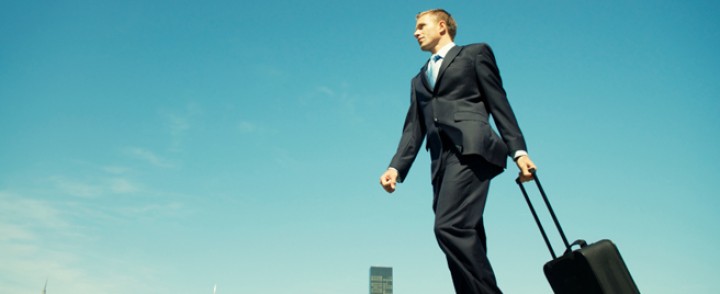UK business travellers are embracing the sharing economy
More than half of company travel policies now allow the use of ride sharing services. Millennials (those aged between 18 to 34) show the greatest appetite for ride-sharing and home-sharing services and are most likely to harness technology whilst traveling.
Millennial business travellers are driving technological change as consumer travel habits continue to impact the business travel experience and corporate travel policy, according to the GBTA Global Business Traveler Sentiment Index, in partnership with American Express.
The research, which includes a survey of 405 UK business travellers, examines satisfaction with all aspects of business travel, and pinpoints the increasing use of technological innovation.
Key UK findings from the research include:
– 51% of company travel policies now allow use of ride share services, suggesting that many companies have ensured their policy reflects the new providers and technologies available.
– Over the next three months, just over one-in-ten (11%) UK business travelers think they will increase their use of ride share services, such as Uber and Lyft. This is primarily driven by younger travellers – over a quarter (28%) of Millennials say they will increase their use of ride share services. None of those over the age of 55 surveyed have plans to increase usage.
Home sharing usage is not yet as widespread as other shared services. Just 28% of company travel policies allow home sharing services, such as Airbnb and HomeAway to be used.
However, almost one in ten respondents (9%) think they will imminently increase their use of home share services. The age divide is, again, evident: 22% of Millennials say they will do so, compared to only 1% of those over 55 years old.
Millennials lead the pack in using social networking sites for business communication
– A majority of UK business travellers (62%) think technology won’t replace face-to-face meetings when conducting business.
– Women (71%) and older workers (73% of those aged 55+) are most likely to think technology won’t replace face-to-face meetings compared to half (53%) of men and 57% of Millennials.
– One-third (35%) think social networking sites help meeting up with colleagues and business contacts when travelling. This comprises over a half (53%) of Millennials, compared to only a third (34%) of those aged 35 to 54 and a mere 15% of those over 55.
– Wi-Fi is considered vital to work productivity by four-in-five (81%) business travellers – and there’s room to improve on-trip connectivity.
– Hotel rooms have the highest satisfaction rating (79%) for Wi-Fi availability and reliability. Just under one-half (46%) of respondents are happy with Wi-Fi on trains and just over one-third (35%) are satisfied with airline Wi-Fi, meaning connectivity presents a clear opportunity for travel providers to improve the journey experience
– During flights, most travellers (57%) don’t work, with many citing on-board hindrances to productivity; one-quarter (24%) tend to do work that requires the internet whilst
flying, whereas the work of one-in-five (20%) does not.
– Millennials (31%) are twice as likely as the over 55’s (15%) to be reliant on internet-based work whilst flying and are roughly twice as likely to cite hindrances to work whilst flying than their elders.
– UK business travellers – like their peers worldwide – are much more confident about the health of their industry than the overall health of the economy
More results:
– 43% of UK business travellers rate the health of their industry as excellent – but only 22% would rate the overall health of the economy as such.
– This reflects the global trend: averaged across all markets, a higher proportion of business travellers rated their industry’s health as excellent (a global average of 51%) than their own domestic economy (global average of 35% rated this as excellent).
Fabienne Cauli, Vice President, Global Client Group, EMEA & JAPA, American Express Global Commercial Payments, commented: “This Index provides a benchmark of business travellers’ changing priorities and expectations – and it’s fascinating to see how this is evolving, thanks, in part, to generational change in the workplace. Younger travellers show clear appetite for using sharing economy services, and have high expectations when it comes to connectivity. These issues are only going to become more prominent in the years ahead, as Millennials represent an ever-growing proportion of the workforce.”
Catherine McGavock, GBTA Regional Vice President, EMEA, commented: “UK business travellers have made clear their views on many aspects of business travel and, whilst 70% of them are generally satisfied with their overall business travel experience, they have pinpointed some areas which those servicing the travel market could improve, for example, when it comes to Wi-Fi connectivity. Recent years have seen unheralded changes in consumers’ technological and service expectations and we’re now in an era where people expect to be able to work and communicate via the internet wherever they are.”
The GBTA Global Business Traveler Sentiment Index, in partnership with American Express, was carried out between March 31 and April 13, 2016, by the GBTA Foundation. An online survey was conducted among a sample of 3,500 business travelers in eight markets: Australia, Canada, Germany, Hong Kong, Japan, Mexico, the United Kingdom and the United States. In the UK, specifically, 405 UK business travellers were surveyed. Eligible respondents were employed part- or full-time and had taken four or more business trips in the past 12 months. For more information, please visit:
https://business.americanexpress.com/us/business-trends-and-insights/business-traveler/business-travel-insights-global-business-traveler-sentiment-index
• Over the next three months, just over one-in-ten (11%) UK business travelers think they will increase their use of ride share services, such as Uber and Lyft.



